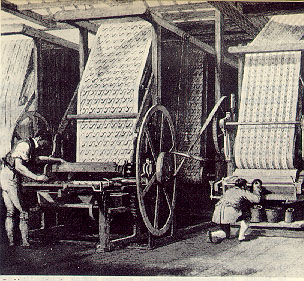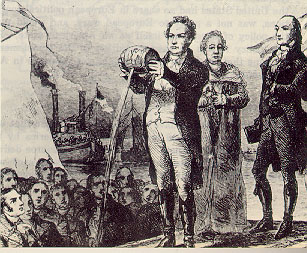
< Previous Page * Next Page >
In 1817, President James Madison had been succeeded by James Monroe who crowned a distinguished public career with a term as President. His two exceptional qualities were his shrewd common sense and strong will and as his successor, John Quincy Adams, put it, he had "a mind sound in its ultimate judgments, and firm in its final conclusions." The event of his administration which has given his name immortality was his enunciation of the so-called Monroe Doctrine.
 |
| Calico printing in a northern mill. Textile machinery made America independent of foreign imports. By 1840, there were 1,200 cotton factories in the United States |
Ever since the English colonies had gained their freedom, the hope of a like liberty had stirred the people of Latin America.
Before 1821, ![]() Argentina
and
Argentina
and ![]() Chile
had established their independence, and in 1822, under the leadership of José de San
Martin and Simón Bólivar, several other South American states won independence. By 1824, only small colonies remained to
several European nations in the West Indies and on the northern coast of South America. These, together with one or two
other British possessions, were the only European colonies remaining in America.
Chile
had established their independence, and in 1822, under the leadership of José de San
Martin and Simón Bólivar, several other South American states won independence. By 1824, only small colonies remained to
several European nations in the West Indies and on the northern coast of South America. These, together with one or two
other British possessions, were the only European colonies remaining in America.
The people of the United States felt a natural and deep interest in what seemed a repetition of their own experience of breaking away from a mastering European government. In 1822, President Monroe, under powerful popular pressure, received authority to recognize the new countries - among them Colombia, Chile, Mexico, Brazil - and soon exchanged ministers with them. This step committed the United States to the principle that these countries were self-sustaining, genuinely independent, and entirely separated from their former European connections. They were confidently accepted as equal sister states- part of a free America.
 |
| De Witt Clinton, New York state governor, pours a kegful of Lake Erie Water into the Atlantic Ocean to celebrate the completion of the 363-mile Erie Canal |
At just this time, a combination of central European powers, commonly called the Holy Alliance, organized for the purpose of guarding the "legitimate" rulers of Europe against revolution. It adopted the practice of intervening in countries where popular movements threatened the thrones of monarchs, hoping to prevent the spread of revolution into their own dominions. This policy was the very antithesis of the American principle of self-determination. The confidence of the United States in the permanence of the new governments in South America received a severe shock when the alliance turned its attention to Spain and her colonies in the New World. To the United States, this looked like the attempt of several European powers to come in and occupy the territories which had freed themselves from Spain. For years the American government had practiced the policy of aloofness laid down by Washington, Hamilton, Jefferson, John Adams, and other early statesmen. Its purport was that the United States had no share in European political combinations, was not a party to European wars, and would pursue the policy of developing itself as an American state. From this policy it was an easy transition to the complementary doctrine that European powers ought not interfere in American affairs.
< Previous Page * Next Page >